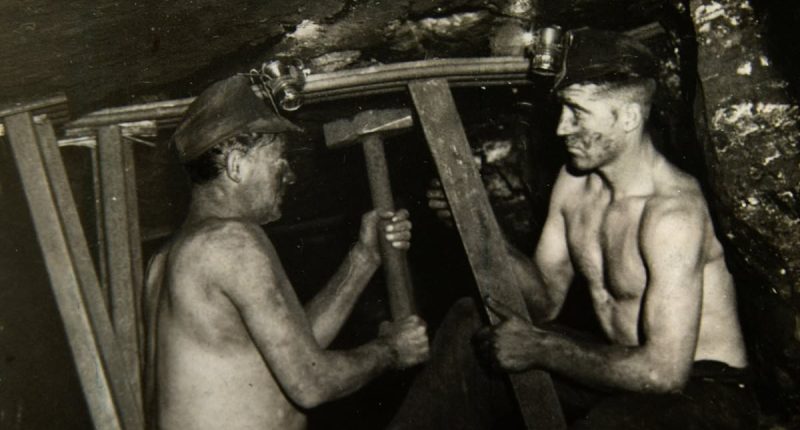Share this @internewscast.com
There was once the strongly held belief that all the Welsh rugby selectors had to do to recruit a world-class fly half was to whistle down a pit and a fully-formed No 10 would emerge.
The mining industry in Scotland unearthed, in contrast, footballing gems. Their lustre has never dimmed. The triumvirate of great managers — Jock Stein, Bill Shankly and Matt Busby — all had mining backgrounds. An army of players, too, emerged from the mines to find freedom on the pitch.
Paddy Wilson was one of them. His life was changed by Stein. ‘He was the greatest man manager,’ he says of the former miner who found immortality in a stadium in Lisbon. ‘He was always helping you. As a young player he would get me tickets for the Beatles and the Rolling Stones. I saw both in the ABC on Lothian Road in Edinburgh.’
‘There were clans of footballers in Fife: the Connellys, the Patons, the Martins, the Potters.’
He adds: ‘There was a centre-half called Elkie Buchanan when I was at Raith Rovers. He came straight up the pit on Wednesday and played against Colin Stein of Rangers. He had a great game, too.’

Many amateur players would work down the mines before emerging on to play football

Jock Stein was the son of a coal miner and spent time down the pits before football took over

An exhibition at Hampden’s Scottish Football Museum explores the links between pit and pitch
There are thousands of such stories. More than 150,000 people were employed in the Scottish coal industry at its peak in the 20th century. Football was a respite from the mines for many and an escape for some.
The story of this bond is told in From Pit to Pitch, an exhibition running at the Scottish Football Museum at Hampden until at least Christmas. It has been organised in conjunction with the National Mining Museum Scotland with the help of a grant from Museum Galleries Scotland.
Demi Boyd, exhibition and collections keeper at the football museum, speaks of how the mines moulded ideal candidates for the pitch. ‘They were all working together in a vital form of team work. They worked hard, too, and would look out for each other.’
The exhibition contains working artefacts and is sprinkled with cups, programmes and sporting memorabilia. But the story still lives. Paddy Wilson tells it. ‘I was born in Valleyfield but my dad went to work in Blairhall Colliery and we moved to Oakley. My dad was a face worker. He would tell me about crawling about in a space measuring 18 inches high.’
Life was easier for the son. ‘I went to the pit at 15. I was a surface worker. I was on the tables. That’s where the coal dropped before being put on the conveyor belts. I later moved into the offices, collar and tie. I managed to stay on the surface.
‘I would go to the pithead and look down as the cage with men was coming up. But I never went down there. You were aware of what they went through. I thought: “Thank goodness, I don’t have to go down”. I didn’t last long at the pit before Mr Stein came along.’

The dangers of life underground were all too evident and many saw football as an escape route
His first meeting with the great man occurred at the Scottish Cup final of 1961 when Dunfermline played Celtic. As a promising player, Wilson was invited to the game. He was introduced to Stein, then the Dunfermline manager, who spotted that Wilson was wearing a Celtic tie.
‘He just said to me: “Well done, son, on supporting your team”.’ Stein’s Dunfermline won after a replay.
The two were to meet shortly afterwards. Wilson’s father was a football man, running the Blairhall Colliery team, and his uncle, John, had played for Celtic. Wilson, at 5ft 5ins, was the epitome of the pacy, tricky winger. He was summoned to Stein’s office and signed for Dunfermline.
‘I had to see the manager at the colliery to put my notice in. It was the best day of my life and I was only 16,’ he says.
Wilson played for Dunfermline, Aberdeen, Raith Rovers and Berwick Rangers in a career that spanned almost 20 years. He then managed Cowdenbeath before leaving football to work in the licensed trade industry.
Stein remains a vivid presence. ‘He was unbelievable,’ says Wilson. ‘I was playing as a kid in a game at St Andrews and got a bad injury. Big Jock came to Oakley to see how I was. His man management was out of this world. He knew what shift my dad and my brothers were on and what they did in the pit. He would always say: “Look after your mum”.’

Bill Shankly grew up in the coal mining village of Glenbuck before football took him south

Manchester United icon Sir Matt Busby was born in mining heartland in Bellshill, Lanarkshire
Stein would also look after his players, sourcing tickets for concerts. ‘That’s how I got to see the Beatles and the Rolling Stones,’ says Wilson.
But Stein could also be a forbidding presence. Wilson continues: ‘When I was playing at Aberdeen we travelled down to Celtic for a game. We walked into the reception area and there was Big Jock, then the Celtic manager, of course, looking down, surveying everything.
‘I had a wee moustache as was the style then. He just said to me: “Even if you cannot play like a footballer, then at least look like one”. ‘I went home that night and shaved it off.’
He adds of Stein: ‘He knew what you were able to do. If you were under-performing he would tell you. He could stand on top of you. But he could build you up. He was a father figure. He was above them all.’
Wilson also encountered a future great manager at Dunfermline. ‘Fergie is my pal,’ he says of Sir Alex, who went on to greatness at Aberdeen and Manchester United. ‘He was great to play with and be with. He would cause a row in an empty room. We used to play two-a-side in training and he could cause mayhem. He was always a winner.’
Wilson was also managed by Eddie Turnbull, a member of Hibs’ Famous Five, who took him to Aberdeen. ‘Turnbull was excellent on tactics but his man management was shocking, He couldn’t communicate. I was getting married in the June but at the end of the season the list went up for a trip to America. My name was on it. I went to his office and told him: “Boss, I am getting married”. He said: “Tough”.

A group of miners head down the shaft for another arduous spell working underground
‘I had to rearrange the wedding. That’s just the way things were back then.’
He and his wife, Erine, returned to Fife when he signed for Raith Rovers. A subsequent coaching career was abandoned. ‘I loved the football but couldn’t take the politics,’ he says succinctly.
He smiles at this, eager to emphasise his gratitude to football. ‘One of the best days in my life was when I walked away from the pit. I was well away from that,’ he says. ‘That trip to America postponed our wedding and caused chaos for Erine but you look back and think: “I was nine weeks in the USA, coast to coast, and getting paid for it”.’
He adds: ‘I had a brilliant life. There were those who went down that shaft and didn’t come back. There were those who went on to lose their jobs as all the pits closed. There are those who suffered illnesses from the coal dust.
I was fortunate I didn’t go down that hole.’
From Pit to Pitch is at the Scottish Football Museum at Hampden until December














